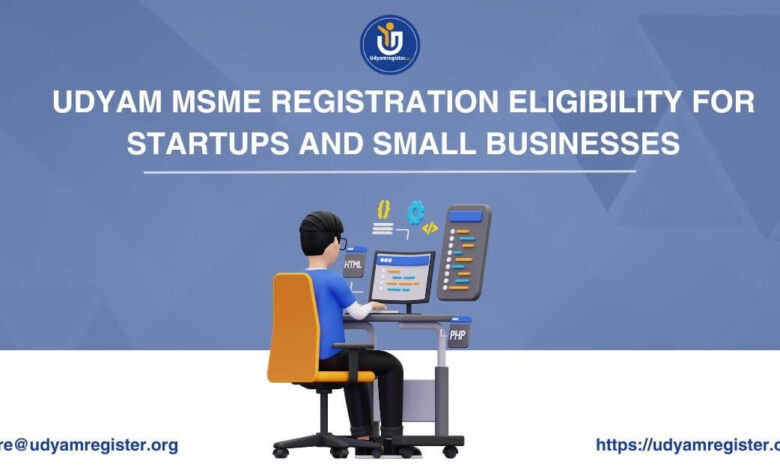Udyam MSME Registration Eligibility for Startups and Small Businesses

Udyam Registration, also known as MSME (Micro, Small, and Medium Enterprises) Registration, is a government initiative to support and promote the growth of startups and small businesses in India. It offers a plethora of benefits, including easier access to loans, subsidies, and various government schemes. However, to take advantage of these benefits, businesses must meet specific eligibility criteria. Here’s a comprehensive guide to Udyam MSME Registration eligibility for startups and small businesses:
Eligibility Criteria for Udyam Registration
1. Definition of MSMEs
The eligibility for Udyam Registration is primarily based on the investment in plant and machinery or equipment and the annual turnover of the enterprise. The classification is as follows:
Micro Enterprises:
Investment in plant and machinery or equipment does not exceed ₹1 crore.
Annual turnover does not exceed ₹5 crore.
Small Enterprises:
Investment in plant and machinery or equipment does not exceed ₹10 crore.
Annual turnover does not exceed ₹50 crore.
Medium Enterprises:
Investment in plant and machinery or equipment does not exceed ₹50 crore.
Annual turnover does not exceed ₹250 crore.
2. Types of Enterprises Eligible
Both manufacturing and service enterprises can apply for Udyam Registration. This includes:
Proprietorships
Partnership firms
Hindu Undivided Families (HUFs)
Limited Liability Partnerships (LLPs)
Private Limited Companies
Public Limited Companies
Co-operative Societies
Any other entity as notified by the government
3. Aadhar Card Requirement
An Aadhaar card is a mandatory requirement for Udyam Registration. The Aadhaar number of the proprietor, partner, or director will be required, depending on the type of entity:
Proprietorship: Aadhaar number of the proprietor.
Partnership Firm: Aadhaar number of the managing partner.
Hindu Undivided Family (HUF): Aadhaar number of the Karta.
Company/LLP/Co-operative Society: Aadhaar number of the authorized signatory.
4. PAN and GSTIN Requirements
PAN: For companies, LLPs, and cooperative societies, a PAN (Permanent Account Number) is mandatory.
GSTIN: GST registration is also required for the entities covered under the GST regime. This helps in integrating Udyam Registration with the GST database for seamless operations.
Benefits of Udyam MSME Registration
Once registered under Udyam, startups, and small businesses can avail themselves of several benefits, including:
Easy Access to Credit: Collateral-free loans from banks and financial institutions.
Subsidies and Incentives: Various subsidies, including technology and quality upgradation, and capital and interest subsidies.
Tax Benefits: Exemptions under direct tax laws.
Ease of Doing Business: Simplified procedures and regulations for business operations.
Market Support: Preference in government tenders and assistance in international trade fairs.
Documents Required for Udyam Registration
The process of Udyam Registration is designed to be straightforward and requires minimal documentation. The key documents required include:
Aadhaar Card: As mentioned earlier, the Aadhaar number of the proprietor, managing partner, or authorized signatory is mandatory.
PAN Card: For businesses other than sole proprietorships, a PAN card is required.
Business Address Proof: This could be a rent agreement, property tax receipt, or utility bill.
Bank Account Details: A copy of the passbook or a canceled cheque from the business bank account.
GSTIN: GST Identification Number, if applicable.
How to Apply for Udyam Registration
Visit the Udyam Registration Portal: Access the official Udyam Registration website.
Provide Basic Details: Enter the Aadhaar number and the name of the entrepreneur.
Fill in Business Details: Provide details related to your business, such as name, type of organization, bank details, and investment.
Pay the fee for your udyam registration application.
Receive Udyam Certificate: Upon successful verification, you will receive a Udyam Registration Certificate with a unique identification number.
By meeting these eligibility criteria, startups and small businesses can leverage the Udyam Registration to fuel their growth and contribute to the economic development of the country. For seamless Udyam Registration, you can also seek professional assistance from platforms like Filing Lounge, which offers end-to-end support in the registration process.
Common Challenges and How to Overcome Them
While the Udyam Registration process is designed to be user-friendly, some startups and small businesses may encounter challenges. Here are common issues and tips on how to overcome them:
1. Aadhaar Authentication Issues
Solution: Ensure that the mobile number linked to the Aadhaar card is active and capable of receiving OTPs. If issues persist, visit the nearest Aadhaar enrollment center to update or verify your details.
2. Incorrect Details Submission
Solution: Double-check all entries before submitting the form. In case of errors, use the edit option available before the final submission. Keeping a copy of your documents handy can help in accurate data entry.
3. Lack of Proper Documentation
Solution: Gather all required documents, such as an Aadhaar card, PAN card, bank details, and business address proof, before starting the registration process. Ensure all documents are current and accurately reflect your business information.
4. Investment and Turnover Calculations
Solution: Calculate the investment in plant and machinery or equipment accurately. Consult with a financial advisor or use accounting software to ensure your figures are correct. This ensures compliance with the MSME classification criteria.
Note: Apply for udyam re-registration through udyam portal.
Conclusion
Udyam MSME Registration opens up a world of opportunities for startups and small businesses. By meeting the eligibility criteria and completing the registration process, businesses can access numerous benefits that support growth and sustainability. Overcoming potential challenges with the right strategies and seeking professional assistance can make the registration process seamless and efficient.




